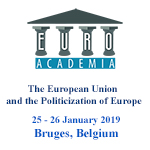Euroacademia Conferences
 Europe Inside-Out: Europe and Europeanness Exposed to Plural Observers (9th Edition) April 24 - 25, 2020
Europe Inside-Out: Europe and Europeanness Exposed to Plural Observers (9th Edition) April 24 - 25, 2020 Identities and Identifications: Politicized Uses of Collective Identities (9th Edition) June 12 - 13, 2020
Identities and Identifications: Politicized Uses of Collective Identities (9th Edition) June 12 - 13, 2020 8th Forum of Critical Studies: Asking Big Questions Again January 24 - 25, 2020
8th Forum of Critical Studies: Asking Big Questions Again January 24 - 25, 2020 Re-Inventing Eastern Europe (7th Edition) December 13 - 14, 2019
Re-Inventing Eastern Europe (7th Edition) December 13 - 14, 2019 The European Union and the Politicization of Europe (8th Edition) October 25 - 26, 2019
The European Union and the Politicization of Europe (8th Edition) October 25 - 26, 2019 Identities and Identifications: Politicized Uses of Collective Identities (8th Edition) June 28 - 29, 2019
Identities and Identifications: Politicized Uses of Collective Identities (8th Edition) June 28 - 29, 2019 The European Union and the Politicization of Europe (7th Edition) January 25 - 26, 2019
The European Union and the Politicization of Europe (7th Edition) January 25 - 26, 2019 7th Forum of Critical Studies: Asking Big Questions Again November 23 - 24, 2018
7th Forum of Critical Studies: Asking Big Questions Again November 23 - 24, 2018 Europe Inside-Out: Europe and Europeanness Exposed to Plural Observers (8th Edition) September 28 - 30, 2018
Europe Inside-Out: Europe and Europeanness Exposed to Plural Observers (8th Edition) September 28 - 30, 2018 Identities and Identifications: Politicized Uses of Collective Identities (7th Edition) June 14 - 15, 2018
Identities and Identifications: Politicized Uses of Collective Identities (7th Edition) June 14 - 15, 2018
The (De)Politicization of Europe through the Migration Crisis
-
-

-
Presentation speakers
- Roila Mavrouli, University of Luxembourg, Luxembourg
Abstract:
The European Union projects its identity on a common destiny despite the heteronomy of its past and legacy. The question of migration contradicts the concept of a European identity by triggering notions as plural identity, the abolition of internal frontiers and the identification to a specific territory. The question of asylum protection interrogates the pre-established area of free movement of goods and people and shatters the traditional concepts of state and sovereignty. Nevertheless, if the frontline countries are the only one affected by the “refugee crisis” conformingly to the DUBLIN regulation, concepts like protection of public order, fight against the abusive free movement or against social tourism do not cease to reappear. Considering that we attend a transition from the traditional form of government to the form of European governance characterized by a strong use of soft law, one cannot help but wonder if the so-called “refugee crisis” is not a European crisis where bifurcation of mobility becomes bifurcation of law. The aim of this contribution is to address the problematics of the endeavor of the European project to form a demos – a collective subject of representation, decision making and rights- in order to legitimize its supranational political power and its consequensces regarding the migration crisis. The formation of a European demos did not ensue because European people(s) is not only a demos but also an ethnos, plethos and laos. Within this paper we will demonstrate this inherent heterogeneity of the word “people” which was one of the reasons of the Euro-crisis. In this sense, do we need to form a European people, a European demos, who will accomplish the European project? If Europe is in crisis, this is also because of the paradox of legitimacy and democratization : in order to achieve legitimacy, we need to subordonate it to a democratization process and not a simple institutional objective. In other words, the distinction between input oriented legitimacy (legitimate political choices because they reflect the will of the people) and output oriented legitimacy (government for the people) shatters the foundation of the European identity. And among those who believe that the EU suffers from a legitimacy crisis, one cannot help but wonder whether European migratory policies confirm a non-sufficient output legitimacy of the EU that shatters the concept of European identity by reproducing national schemes and categorizing people to citizens and non-citizens, to nationals and aliens and to authorized and unauthorized migrants. The reflexion to be done is how the transition from the traditional model of government to the model of European governance can be achieved through a full democratization of EU politics or through increasing fragmentation and division. The answer to this reflexion shall be given through the (de)politicization of Europe regarding irregular human mobilities who have scrambled and re-shuffled the social and political geography of Europe.
-
Related Presentations

The Myth of a Liberal Brexit: How Brexiteers (Mis)Used History in their Quest for British ‘Freedom’
- Alistair Somerville

The Rise of Ethno-nationalist Populism in Slovenia
- Iztok Šori
- Mojca Pajnik

Politicization of Europe without the Peoples of Europe?
- Carles José i Mestre













